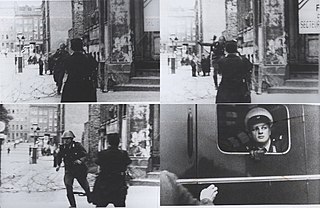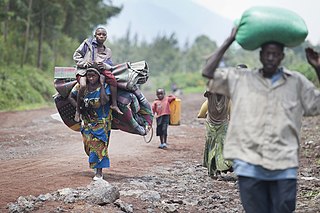The United Nations High Commissioner for Refugees (UNHCR) is a United Nations agency mandated to aid and protect refugees, forcibly displaced communities, and stateless people, and to assist in their voluntary repatriation, local integration or resettlement to a third country. It is headquartered in Geneva, Switzerland, with over 18,879 staff working in 138 countries as of 2020.

The International Organization for Migration (IOM) is the principal United Nations agency working in the field of migration. The organization implements operational assistance programmes for migrants, including internally displaced persons, refugees, and migrant workers.

A refugee, conventionally speaking, is a person who has lost the protection of their country of origin and who cannot or is unwilling to return there due to well-founded fear of persecution. Such a person may be called an asylum seeker until granted refugee status by the contracting state or the United Nations High Commissioner for Refugees (UNHCR) if they formally make a claim for asylum.

An internally displaced person (IDP) is someone who is forced to leave their home but who remains within their country's borders. They are often referred to as refugees, although they do not fall within the legal definitions of a refugee.

A refugee camp is a temporary settlement built to receive refugees and people in refugee-like situations. Refugee camps usually accommodate displaced people who have fled their home country, but camps are also made for internally displaced people. Usually, refugees seek asylum after they have escaped war in their home countries, but some camps also house environmental and economic migrants. Camps with over a hundred thousand people are common, but as of 2012, the average-sized camp housed around 11,400. They are usually built and run by a government, the United Nations, international organizations, or non-governmental organization. Unofficial refugee camps, such as Idomeni in Greece or the Calais jungle in France, are where refugees are largely left without the support of governments or international organizations.

Dadaab is a semi-arid town in Garissa County, Kenya. It is the site of a UNHCR base hosting 223,420 registered refugees and asylum seekers in three camps as of 13 May 2019, making it the third-largest such complex in the world. The centre is run by the United Nations High Commissioner for Refugees, and its operations are financed by foreign donors. In 2013, UNHCR, the governments of Kenya and Somalia signed a tripartite agreement facilitating the repatriation of Somali refugees at the complex.

The Jesuit Refugee Service (JRS) is an international Catholic organisation with a mission to accompany, serve, and advocate on behalf of refugees and other forcibly displaced persons, that they may heal, learn, and determine their own future. Founded in November 1980 as a work of the Society of Jesus, JRS was officially registered on 19 March 2000 in Vatican City as a foundation. The impetus to found JRS came from the then superior general of the Jesuits, Pedro Arrupe, who was inspired to action by the plight of Vietnamese boat people. JRS has programmes in over 55 countries. The areas of work are in the field of education, emergency assistance, health care, livelihoods, reconciliation, and psychosocial support. JRS is also involved in advocacy and human rights work. This involves ensuring that refugees are afforded their full rights as guaranteed by the 1951 Geneva Convention relating to the Status of Refugees and working to strengthen the protection afforded to Internally displaced persons (IDPs). JRS's international headquarters is located in Rome at the Society's General Curia. The International Director is Br Michael Schöpf SJ.

Jan Egeland is a Norwegian diplomat, political scientist, humanitarian leader and former Labour Party politician who has been Secretary General of the Norwegian Refugee Council since 2013. He served as State Secretary in the Norwegian Ministry of Foreign Affairs from 1990 to 1997 and as United Nations Undersecretary-General for Humanitarian Affairs and Emergency Relief Coordinator from 2003 to 2006.

Danish Refugee Council (DRC) is a private Danish humanitarian nonprofit organization, founded in 1956. It serves as an umbrella organization for 33 member organizations.

Transitional shelter is any of a range of shelter options that help people affected by conflict or natural disasters who have lost or abandoned their housing until they can return to or recover acceptable permanent accommodation. The term refers to an incremental process rather than a product, in which a shelter can be:
- upgraded into part of a permanent house;
- reused for another purpose;
- relocated from a temporary site to a permanent location;
- resold, to generate income to aid with recovery; and
- recycled for reconstruction.
Bruno Geddo is an Italian national, born in Novara in 1959. He has served with the United Nations High Commissioner for Refugees (UNHCR) for over 30 years in Sub-Saharan Africa, North Africa and the Middle East.
Scott Leckie is an international human rights and global housing advocate in the field of economic, social and cultural rights. He established several human rights organisations and remedial institutions.

Walter Kälin is a Swiss humanitarian, constitutional lawyer, international human rights lawyer, activist, and advocate. He is also known as a legal scholar and a renowned professor. He has been a leader in changing Swiss laws and international laws for humanitarian purposes and he has been published extensively on issues of human rights law, the law of internally displaced persons, refugee law, and Swiss constitutional law.

The Kampala Convention is a treaty of the African Union (AU) that addresses internal displacement caused by armed conflict, natural disasters and large-scale development projects in Africa.

Present absentees are Arab internally displaced persons (IDPs) who fled or were expelled from their homes in Mandatory Palestine during the 1947–1949 Palestine war but remained within the area that became the state of Israel.
The Internal Displacement Monitoring Centre or IDMC is an international non-governmental organization established in 1998 by the Norwegian Refugee Council in Geneva.
Butterflies with New Wings Building a Future is a non-profit organization from Buenaventura, Colombia. The organization is a self-help group of forcibly displaced, local women. The organization was established in 2010. It consists of nine women's rights groups. During 2014 the group was led by Mery Medina, Gloria Amparo and Maritza Asprilla.
United Nations General Assembly Resolution 48/144 of 20 December 1993 is a resolution in which the General Assembly expressed its concern at the ongoing degradation of the humanitarian situation in Azerbaijan because of the displacement of considerable number of citizens due to Nagorno Karabakh conflict and supporting "emergency international assistance to refugees and displaced persons in Azerbaijan". The resolution is titled “48/114. Emergency international assistance to refugees and displaced persons in Azerbaijan”. It became the fifth United Nations document concerning Nagorno-Karabakh and the first United Nations General Assembly document on humanitarian aid to those affected by this conflict. This resolution was the first international document affirming the number of refugees and displaced persons in Azerbaijan exceeded one million. The document does not make any specific reference to previous UN resolutions on the ongoing conflict, but "its relevant resolutions regarding humanitarian assistance to refugees and displaced persons". The resolution was adopted by consensus without voting.
Steven Patrick Dennis, known as Steve Dennis, is a Canadian humanitarian worker who in 2012 was violently abducted from Dadaab refugee camp, Kenya, before being rescued in a gunfight by an armed militia. Dennis' litigation against his employer was the first time that a European court has ruled on the duty of care of aid workers.
International Council for Voluntary Agencies is a Switzerland-based global network of humanitarian organisations working on migration and refugee issues. It won the Nansen Refugee Award in 1963.












